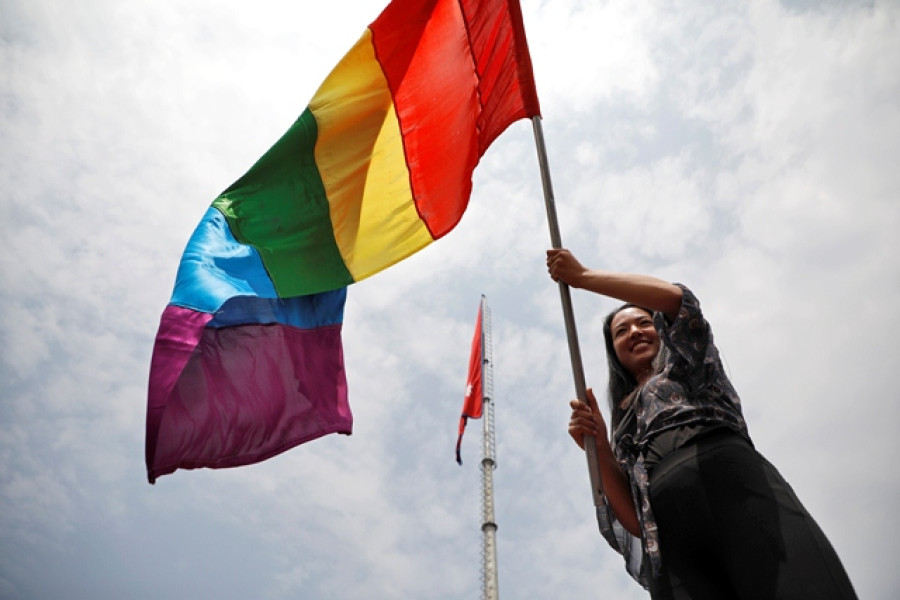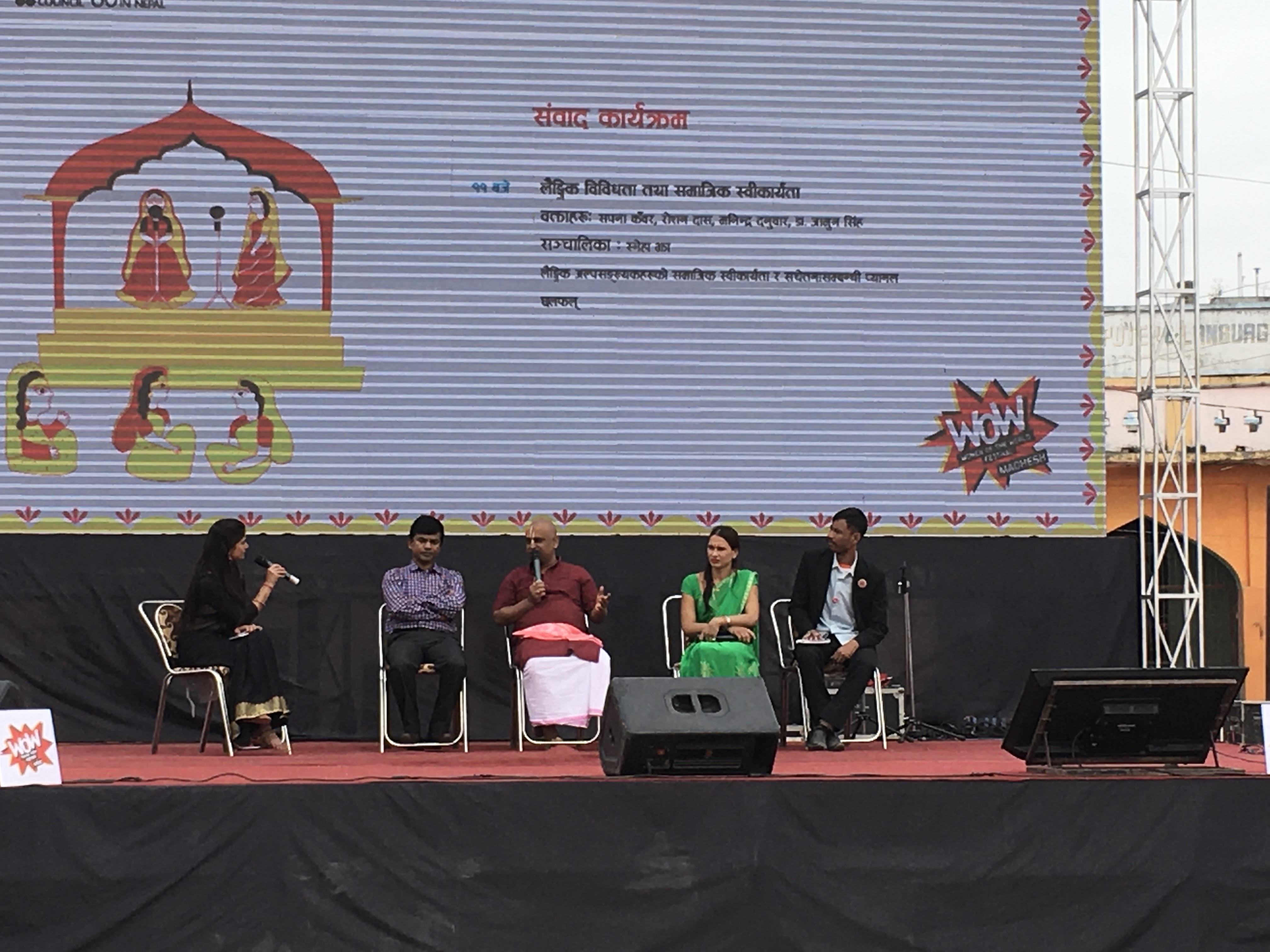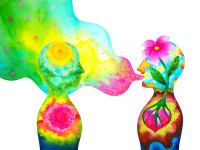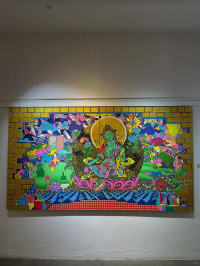Culture & Lifestyle
Let’s talk about the queer
Bringing LGBTIQ discussions to the mainstream at WOW festival, as the community struggles for social acceptance.
Srizu Bajracharya
As the temperature gradually rises in Janakpur, hundreds of people flock to the premises of Janaki Mandir, where an unusual celebration’s liveliness fills the air. At the stage of the Women of the World Festival, Janaki Temple’s Mahantha Ram Roshan Das tells the audience, “Hinduism has always acknowledged the third gender.”
As Das addressed the crowd during the LGBTIQ panel discussion about social acceptance of gender minorities at the WOW Festival, an annual event that celebrates the achievements of Nepali women, many in the audience listened intently to the LGBTIQ narratives. The panel discussion was conducted in the Maithili language to help the local audience have a clear understanding of the issue. “It was a rare conversation to have in public and that too in Janakpur. Although the LGBTIQ people have always been part of our society, people here don’t usually talk about or address them directly,” said Sneha Jha, director of Vaidehi Media, who moderated the session.
In Hinduism, powerful deities have often manifested themselves in ambiguous gender roles. Even in the Hindu epic Mahabharata, Arjun, one among the five Pandavas, lived as a member of the ‘kinnar’ community for a year, as Brihannala, a dance teacher. It is believed that the blessings from the kinnar community endow good fortune.
Historically, they were seen as demi-gods, and in palaces, they were in authoritative roles that allowed them to consult in political and societal systems, according to an article published in the HuffPost. But despite the historical narratives that see them in powerful and dignified roles, the LGBTIQ community still struggles for social acceptance. Many still have to bear with the social stigma associated with their identity and orientation. For many in the community, these narratives have also pushed them to perform typecast roles. The LGBTIQ community have also criticised the social, cultural, and religious narratives of painting black and white pictures when it comes to recognising gender identity in Nepal.

“I probably wouldn’t have disclosed my identity had I not mustered the courage to participate in the 2017 Mr Gay pageant,” says Manindra Dunuwar, Mr Gay Nepal 2017. “I identify myself as a gay person, but when I was growing up, many people used to call me ‘londa’ just to humiliate me.”
Dunuwar was also one of the speakers in the panel discussion and had voiced how the stigma associated with the LGBTIQ identity has often barred many from the community from getting a proper education. “While I believe many from the community are innately artistic and creative, I also think discrimination against us has narrowed down opportunities of growth for us. Many
from the community still have to struggle to even get citizenship,” said Dunuwar during the conversation.
Even though the Supreme Court of Nepal recognised transgender individuals as third gender, on December 21, 2007, the verdict also directed the government to issue citizenship and passports with their gender marked as ‘O’ for ‘other’. Young members of the queer community have criticised this decision as boxing them into a “bracket” rather than acknowledging gender on a spectrum. They say queers shouldn’t even be identified as ‘third gender’ if they don’t prefer to.
To add to the queer community’s woes, a recent bill registered by the Home Ministry demands proof of gender transformation to obtain new citizenship. This has also garnered widespread reservations, which according to LGBTIQ groups, is vaguely worded and can result in further discrimination against sexual minorities.
But Das believes that the Hindu religion itself has never discriminated against the LGBTIQ community. “Our religion has always seen them as equal to any other human being. The discrimination probably started with someone in power emphasising them as abnormal which they aren’t,” he says. “They are just as capable as any human, therefore, I felt it was important to talk about their social acceptance in the WOW festival. Discrimination against them is a human-made social ill.”
The organisers say, in addition to having panellists from all spectrum of the LGBTIQ community, they had also invited Das, who is a venerated priest in his community, and Dr Jamun Singh, a paediatrician, to be part of it to change how people see the LGBTIQ community.
The panel discussion, however, emphasised it is the voices of the queer community that should be brought into the forefront. And to encourage such voices, members from all corners of society should participate in the discussions regarding their rights and respectful space in the society.
“Many people think gender is assigned during birth but that’s not true, many people start identifying themselves only after a certain age,” says Singh. “And this is something that people need to know.”
Many people from the LGBTIQ community fear discrimination upon revealing their identity to society and hence are forced to remain in the closet. In many cases, those who have opened up about their identity and orientation, prefer to stay close to the LGBTIQ community and not mingle with the larger part of the society, where they are treated as outsiders.
Sapana Kanwar, another panellist during the session, shared how at the age of 11, she decided to leave her family and live with the kinnar community because at that time she felt that she was the reason behind the pain for her family. Over the years, although the LGBTIQ community has received visibility, and a slow acceptance, Kanwar still prefers to live with the kinnar community. “I talk with my parents now, but then I feel more at home with my kinnar community, as when I am outside the group, people still see me with disgust,” she said at the discussion.
While in the past few years, LGBTIQ movements have garnered momentum, social acceptance for them has still been very gradual.
“Conversations around social acceptance give a chance for growth for everyone and that’s why it’s important that we make way for such conversations,” says Madhurima Bhadra who curated the panel discussion.




 14.24°C Kathmandu
14.24°C Kathmandu



.jpg&w=200&height=120)











